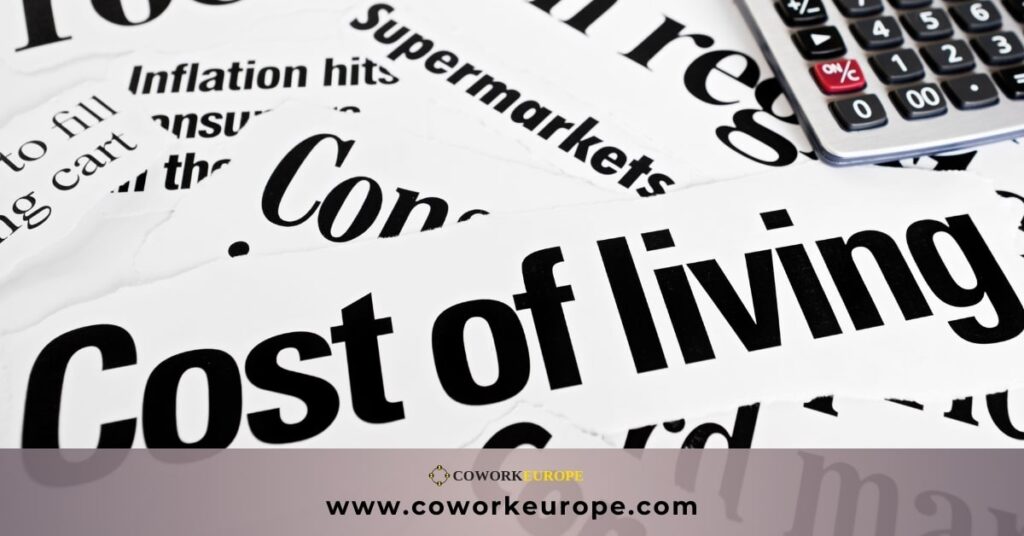Thinking about moving or traveling in Europe? Knowing how much things cost in different cities can help you plan your budget. This guide will compare the cost of living in several European cities to help you see how far your money will go. By understanding these differences, you can make better decisions about where to live, work, or vacation. Cost of living comparisons are essential for anyone wanting to manage their expenses effectively and enjoy their time in Europe without financial stress..
What is Cost of Living?
“Cost of living” means how much money you need to live in a place. This includes things like rent, food, transportation, healthcare, and fun activities. Knowing these costs helps you understand how much you might spend in a new city.
Key Things That Affect Cost of Living Comparisons
Housing
Housing is usually the biggest cost. This includes rent, utilities, and property taxes. For example, renting an apartment in London is much more expensive than in Lisbon or Valletta.
Food
Food costs include groceries and eating out. Cities like Paris and Zurich have high prices for restaurants, while cities like Budapest and Valletta are more affordable.
Transportation
Transportation costs include public transit, fuel, and car maintenance. Cities with good public transit, like Berlin and Vienna, often have lower costs. In cities with less transit, like Oslo, you might spend more on owning a car.
Cost of Living Comparisons: Healthcare
Healthcare costs can vary. Most European cities have good public healthcare, but private care can be more expensive. For example, healthcare in Copenhagen is usually cheaper than in Monaco.
Entertainment
Entertainment costs include things like movies, gym memberships, and cultural events. Cities with high living costs often have more expensive entertainment options. Going out in Amsterdam or Barcelona can be more costly than in smaller cities like Bratislava or Valletta.
Cost of Living Comparisons: Affordable European Cities
London, UK
London is very expensive. Renting a one-bedroom apartment in central London costs about £2,500 per month. Food, transportation, and entertainment are also costly.
Paris, France
Paris is beautiful but pricey. Renting an apartment in central Paris costs between €1,500 and €2,500 per month. A meal at a mid-range restaurant costs about €20 to €30. A monthly Metro pass is around €75.
Zurich, Switzerland
Zurich is very costly. Renting an apartment in central Zurich costs between CHF 2,500 and CHF 3,500 per month. Food and dining are expensive. Public transportation adds to the cost.
Berlin, Germany
Berlin is more affordable. Renting a one-bedroom apartment in central Berlin costs between €1,000 and €1,500 per month. Food and dining are cheaper, and public transportation is reasonably priced.
Madrid, Spain
Madrid is known for its vibrant culture and reasonable costs. Renting an apartment in central Madrid costs about €800 to €1,200 per month. Dining out costs around €15 to €25. Public transportation is cheap.
Lisbon, Portugal
Lisbon is one of the cheaper capitals in Europe. Renting an apartment in central Lisbon costs around €700 to €1,000 per month. Food and dining are affordable, and public transportation is inexpensive.
Prague, Czech Republic
Prague is budget-friendly compared to Western Europe. Renting an apartment in central Prague costs about €600 to €900 per month. Meals at mid-range restaurants cost about €10 to €20. Public transportation is very cheap.
Budapest, Hungary
Budapest is also affordable. Renting an apartment in central Budapest costs around €500 to €800 per month. Food and dining are inexpensive, with meals costing about €10 to €15. Public transportation is low-cost.
Vienna, Austria
Vienna is more expensive but still cheaper than Zurich or London. Renting an apartment in central Vienna costs about €1,200 to €1,800 per month. Food and dining are reasonably priced, and public transportation is good.
Porto, Portugal
Porto is similar to Lisbon but usually cheaper. Renting an apartment in central Porto costs around €600 to €900 per month. Food and dining are very affordable, and public transportation is budget-friendly.
Cost of Living Comparisons in Valletta, Malta
Valletta, the capital of Malta, is quite affordable. Renting a one-bedroom apartment in central Valletta costs about €800 to €1,200 per month. Food prices are reasonable, and dining out is cheaper compared to cities like Paris or London, with meals costing around €15 to €20. Public transportation in Valletta is free.
If you’re looking for even cheaper options in Malta, consider living in nearby places like Mosta or Bugibba. They have lower rents and costs for everyday items. Moreover, Malta is one of the most multicultural places, welcoming people from all over the world.
Tips for Saving on Living Costs Based on Cost of Living Comparisons
Budgeting and Planning
Create a budget by listing your expected expenses and comparing them with your income. This helps you manage your money better.
Housing Choices
Consider living outside the city center to lower rent costs. Shared housing can also save you money.
Food and Dining
Cook at home more often and shop at local markets for fresh, affordable food. Dining out less can help you save money.
Cost of Living Comparisons: Transportation Alternatives
Use public transportation if available, and consider walking or cycling for short trips to save on transportation costs.
Entertainment Savings
Look for free or low-cost activities in your city. Many places offer free cultural events, museum days, and other budget-friendly options.
Cost of Living Comparisons: Final Thoughts
Knowing the cost of living in different European cities helps you plan your budget and make better choices about where to live or visit. By comparing costs for housing, food, transportation, healthcare, and entertainment, you can manage your money better. Each city has different costs and lifestyles, so think about what’s most important to you.









